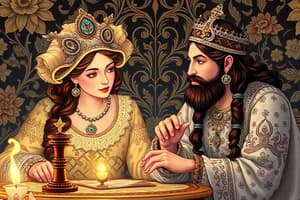Podcast
Questions and Answers
Design decisions often involve a ______ where opposing elements must be considered.
Design decisions often involve a ______ where opposing elements must be considered.
trade-off
Finding the perfect level of ______ is crucial for engaging different types of players.
Finding the perfect level of ______ is crucial for engaging different types of players.
challenge
Designing with the target audience in mind helps to set the game's standard level of ______.
Designing with the target audience in mind helps to set the game's standard level of ______.
difficulty
Adjusting a game's difficulty typically modifies values like enemy density and damage ______.
Adjusting a game's difficulty typically modifies values like enemy density and damage ______.
The best approach in game design may involve focusing more on ______ mode features than on balancing multiple difficulty settings.
The best approach in game design may involve focusing more on ______ mode features than on balancing multiple difficulty settings.
The accuracy of simulating behaviors and phenomena may be directly or inversely proportional to the game's ______ value.
The accuracy of simulating behaviors and phenomena may be directly or inversely proportional to the game's ______ value.
Abstract games can hook players more easily because they provide immediate ______.
Abstract games can hook players more easily because they provide immediate ______.
In economic simulations, gameplay revolves around discovering the hidden ______ between player actions and their consequences.
In economic simulations, gameplay revolves around discovering the hidden ______ between player actions and their consequences.
A flight simulator has realistic flight physics and controls, resulting in a very steep learning ______.
A flight simulator has realistic flight physics and controls, resulting in a very steep learning ______.
Realism in games can lead to boredom if it includes long wait times and ______ device failures.
Realism in games can lead to boredom if it includes long wait times and ______ device failures.
Diluting the realism of the experience too much can take the ______ and immersion out of the game.
Diluting the realism of the experience too much can take the ______ and immersion out of the game.
Players often have certain assumptions about in-game items, such as firearms, based on their ______ representation.
Players often have certain assumptions about in-game items, such as firearms, based on their ______ representation.
Whether a game is a simulator or not can determine how closely it reflects actual ______.
Whether a game is a simulator or not can determine how closely it reflects actual ______.
Modeling reality can improve ______!
Modeling reality can improve ______!
In games, structure is often contrasted with ______.
In games, structure is often contrasted with ______.
Players in management games can perform a large number of various ______, within the game rules.
Players in management games can perform a large number of various ______, within the game rules.
Story-driven games often provide one ultimate goal or a series of major ______.
Story-driven games often provide one ultimate goal or a series of major ______.
An example of a game that focuses on a strict path from start to end is a visual ______.
An example of a game that focuses on a strict path from start to end is a visual ______.
Mood in a game can affect how empowered the player feels compared to the ______ they control.
Mood in a game can affect how empowered the player feels compared to the ______ they control.
Players often find compelling storytelling enjoyable, as human beings have been entertained by ______.
Players often find compelling storytelling enjoyable, as human beings have been entertained by ______.
If a game's scene's lighting is too low, most players will have difficulty seeing, impacting their overall ______.
If a game's scene's lighting is too low, most players will have difficulty seeing, impacting their overall ______.
Players of a new game who are familiar with other games of the same ______ can easily get started.
Players of a new game who are familiar with other games of the same ______ can easily get started.
Innovative games are relatively difficult to explain to new ______ / playtest.
Innovative games are relatively difficult to explain to new ______ / playtest.
The trade-off affects design decisions concerning game mechanics and ______.
The trade-off affects design decisions concerning game mechanics and ______.
A game with elaborate, detailed, or varied gameplay will take a long time to ______.
A game with elaborate, detailed, or varied gameplay will take a long time to ______.
Probability that all players will stay from beginning to end of a game session is inversely proportional to the number of ______ and the game's duration.
Probability that all players will stay from beginning to end of a game session is inversely proportional to the number of ______ and the game's duration.
Multiplayer sessions, if part of your game, should be as ______ as possible.
Multiplayer sessions, if part of your game, should be as ______ as possible.
A game can be a clone of a well-known game, which implies a sense of ______.
A game can be a clone of a well-known game, which implies a sense of ______.
If a game does not fit under any current ______, it is considered innovative and completely new.
If a game does not fit under any current ______, it is considered innovative and completely new.
Pace defines the rhythm of the game, determined by comparing the amount of time required to perform a complete set of actions to the workload that has to be handled in that time period, which is measured in ______.
Pace defines the rhythm of the game, determined by comparing the amount of time required to perform a complete set of actions to the workload that has to be handled in that time period, which is measured in ______.
Turn-based games with no turn time limits have a very slow ______.
Turn-based games with no turn time limits have a very slow ______.
Empire-building games target a patient ______.
Empire-building games target a patient ______.
Broad and fast-paced games must not be too ______ so that the player can still manage.
Broad and fast-paced games must not be too ______ so that the player can still manage.
Deep and broad games should have a slow ______ so that players can perform without unnecessary pressure.
Deep and broad games should have a slow ______ so that players can perform without unnecessary pressure.
For action games, keep in-game, non-cutscene story segments ______ to let the player focus on the fight.
For action games, keep in-game, non-cutscene story segments ______ to let the player focus on the fight.
A broad, deep, and fast-paced game would overload the player's human ______.
A broad, deep, and fast-paced game would overload the player's human ______.
The trade-off in game design is arguably the most influential when it comes to a game's motor skill ______.
The trade-off in game design is arguably the most influential when it comes to a game's motor skill ______.
Flashcards are hidden until you start studying
Study Notes
Trade-Offs in Game Design
- Design decisions often involve trade-offs, where opposing elements may coexist.
- Finding the optimal challenge level is crucial; not all players have the same skill set.
Balance vs Enjoyment
- Different player types: hardcore gamers, novices, and casual players who may use cheats.
- Target audience analysis is essential for setting difficulty levels.
- Investment in balanced normal mode features can enhance core gameplay more than extensive easy/hard modes.
- Difficulty adjustments often involve changing numeric values rather than core gameplay aspects.
Realism vs Understandability
- The accuracy of simulating behaviors can affect player engagement and entertainment value.
- Abstract games can appeal more quickly to players who seek immediate satisfaction.
- Complex games offer depth but require learning time for player engagement.
- Clear communication of player actions and their effects is vital for understanding.
- Balance realism; excessive realism may detract from enjoyment, while too much abstraction can impair immersion.
Structure vs Freedom
- Trade-off between linearity (structured objectives) and non-linearity (freedom to explore and make choices).
- Story-driven games may offer primary goals but can include side quests for additional engagement.
- Visual novels may have strict paths, while open-world games provide multiple approaches and endings.
Mood vs Playability
- Some experiences require compromise between realism and enjoyable gameplay.
- Unpleasant real-life situations often do not translate well to games unless in specific genres (e.g., horror).
- Player empowerment and responsive controls are key to retaining enjoyment in various scenarios.
Innovation vs Familiarity
- Established genres standardize gameplay interfaces, making it easier for players to acclimate to new games.
- Innovative designs risk alienating players familiar with traditional mechanics or dynamics.
- Justifying design deviations is critical for player acceptance.
Scope vs Concision
- Detailed gameplay can prolong completion time, beneficial for single-player but risky for multiplayer formats.
- Multiplayer games should aim for brief, engaging sessions due to player availability and interest fluctuations.
Breadth vs Depth vs Pace
- Pace is influenced by the complexity of actions and player workload within the gameplay.
- Different genres require different pacing; deep games favor slow pacing to allow thoughtful action.
- Broad and fast-paced games should avoid excessive complexity to maintain player manageability.
- Balancing breadth, depth, and pace is essential for optimal motor skill demands and overall gameplay experience.
Conclusion
- Game design often involves difficult choices; conflicting ideas can complicate development.
- Understanding player expectations and interests is crucial for successful game design.
Studying That Suits You
Use AI to generate personalized quizzes and flashcards to suit your learning preferences.




